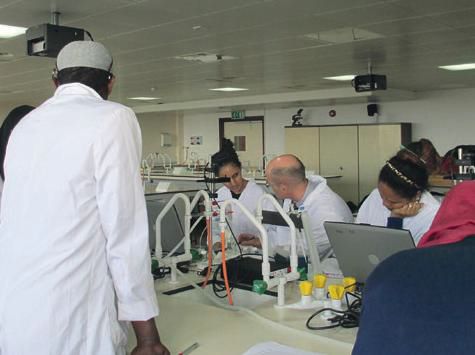
Physiology News Magazine
Physiology to pedagogy
Membership
Physiology to pedagogy
Membership
Nicholas Freestone
University of Kingston, UK
https://doi.org/10.36866/pn.97.40

Background context
For UK physiologists working as lecturers in universities, research in that discipline is probably what defines them in terms of their professional roles and expertise. However, we are living in changing times and along with being skilled at the practice of our discipline many of us must also transmit physiological knowledge and expertise to our students, who will be the next generation of physiologists, as well as to the public who need a better understanding of physiology. Life as a physiology academic has shifted from one rooted purely in the discipline to one which must engage with the pedagogical aspects of that discipline for the benefit of our student learners. This dispositional shift experienced by many of us will only be accentuated in the future as the cap on student numbers is lifted by the government in 2015. How is the physiology academic to respond to these pressures and drivers at a personal level as well as at an institutional level where increasing student numbers on expensive laboratory-based courses will be the subject of particular stresses and strains? The massification of the HE system invariably means that time available for research is also severely constrained so we may have to concentrate on the learning and teaching and administrative aspects of our roles, whether we want to or not.
Up to the present, the state has allowed large increases in the number of students feeding through the university system with no corresponding increase in state funding to manage these greater numbers of students. This may be thought to be a serious detractor of teaching quality. It has, however, at least had the effect of drawing attention to the pedagogical responses needed to cope with the new stresses imposed upon the HE system. Since the Dearing Report (1997), the professionalisation of university teaching has been a much cited aspiration in the UK HE sector.
‘Effective teaching and learning is essential if we are to promote excellence and opportunity in higher education. High quality teaching must be recognised and rewarded, and best practice shared’ (my italics).
The above quote was contained in the UK Government’s 2003 White Paper The Future of Higher Education. However, it is not readily apparent that teaching in the university sector has been rewarded in the way envisaged. More recently Willett’s report for the Social Market Foundation (Robbins revisited: Bigger and Better Higher Education, 2013) explicitly places the student in the role of consumer of goods and services provided by the HE system. All of the costs of a degree are now placed onto the prospective student. In this context, emphasis on high ‘quality’ teaching rather than discipline-specific research would seem to be even more of an imperative for UK universities. In particular Willetts wanted to ‘strengthen the incentives to focus on teaching’ as he deemed that the pendulum had swung too far in favour of rewarding excellence in research (Willetts, 2013).
Even now, the role of learning and teaching in UK universities has not had the attention that it deserves. Many of us currently teaching physiology were probably not formally qualified to teach when we entered academic life. In my case, my research experience of spending days alone in a darkened room staring at fluorescently labelled cardiac cells down a microscope probably made me poorly suited to teach Introductory Physiology to large cohorts of eager first year undergraduates. I am sure this is similar to the experience of many other colleagues. However, the lifting of the cap on student numbers and the introduction of student fees has been driven, in part, to elevate the role of learning and teaching at universities and to make student satisfaction with their educational provision key determinants of university performance measures.
In responding to this challenge the HE sector has, so far, paid lip service to the concept of the professionalisation of university teaching (Cashmore et al. 2013). It is still undoubtedly true that career progression for colleagues across the sector is more straightforward when it is concentrated on the research arm of their practice. Career progression for those colleagues focusing on the learning and teaching aspects of their practice is not so simple. Thus it remains the case that there are very few pedagogical professors in the STEM subjects in UK universities and even fewer in the discipline of physiology.
This may be due to the fact that, as the Higher Education Quality Council stated, ‘at least part of [the] problem might be that universities had not adequately addressed the issue of what makes up quality in teaching’. Therefore, the reluctance of UK universities to promote academics through their teaching ability alone may reside in the fact that objective criteria to compare the ‘excellence’ of different academics’ teaching are absent. This fact contrasts markedly with the promotion path for research-orientated academics where objective criteria for progression are explicit, transparent and adhered to (publication outputs, grants received, PhD completions, etc.). This places the learning and teaching specialist at a significant disadvantage for advancement within the UK HE sector.
So we have a context whereby we have in the recent past seen a massive expansion in student numbers, a future where this expansion may further increase and a government intent on rebalancing the role of teaching relative to research in part by making student satisfaction one of universities’ key performance indicators. What mechanisms are there in place that might help lecturers to manage these complex and multi-faceted challenges?
Academics’ possible response
Most universities now require new academics to enrol on postgraduate certificate in education-type courses. These tend to give rather generic instruction in the fundamentals of learning and teaching and are received with varying degrees of enthusiasm by the participants. More recently many institutions have aligned elements of their career progression criteria to the revised United Kingdom Professional Standards Framework (UKPSF) launched by the Higher Education Academy (HEA) in 2011. This framework seeks to benchmark ‘success within HE teaching and learning support’ (HEA, 2014). The possibility of progression in the university system by evidencing strengths in learning and teaching underpinned by the UKPSF has encouraged many colleagues to seek Higher Education Academy (HEA) recognition linked to the various dimensions of the UKPSF. To aid colleagues in this process, all of the HEA events in the coming academic year (15 in total nationally) will be explicitly mapped to the UKPSF.
At different stages of one’s career, one can apply to become an Associate Fellow, Fellow, Senior Fellow or Principal Fellow of the HEA. Whilst this scheme has been promoted by the HEA, many individual institutions are also now able to award their own fellowships accredited by the HEA. There is also the facility to obtain recognition online (by logging in to the MyAcademy section of the HEA website) making the application process quicker and easier. One would then be able to demonstrate Continuing Professional Development (CPD) by participating in events, developing learning tools or undertaking pedagogical research. It may be the case in the future that, by benchmarking one’s role against the UKPSF and HEA Fellowships, one may more easily delineate a career path characterised by an emphasis on the pedagogy of physiology.
My own story
My own career progression in a post-1992, multi-faculty civic university which wholeheartedly endorses a Widening Participation ethos, has indeed been helped rather than hindered by a focus on the learning and teaching aspects of my role (this might be expected given that it is not a research-intensive university but even here it has been the case in the past that promotion was more easily gained through a focus on research). Upon taking up my first academic position I was quickly thrust into the development of a new degree programme important for the sustainable future of my School. It was necessary therefore for my immediate focus to be on the development and subsequent administration of a coherent new learning programme. This, of course, severely restricted my opportunities to develop a laboratory-based research programme in the crucial early years of my academic tenure.

However, despite the frustrations that this situation caused, it gradually dawned on me that all of the basic elements of a research area were readily available. I had become increasingly interested, due to my prolonged and close contact with undergraduate students, in how they learned and negotiated their way through their degree programmes. Getting to know my learners as individuals opened up a vast array of interesting personal circumstances, experiences and learning styles that I found increasingly fascinating. How could I develop this interest in the process of learning into a fruitful area of research?
Here, again I was very fortunate to, almost accidentally, come into contact with the Biosciences special interest group of the HEA. This provided a very supportive, collegial and collaborative environment in which to gain exposure to, and experience of, the application of qualitative social science research methods in pursuit of knowledge about the nature of learning in our UK HE context. I quickly came to realise that such research was not so dissimilar from our quantitative laboratory-based physiological research, i.e. find an interesting research question, use the most appropriate method to investigate that question, obtain data, analyse the data and then disseminate it at conferences and/or in papers (here The Physiological Society deserves a special mention for continuing to sponsor an Education and Teaching Theme at its annual Main Meeting).
Apart from career progression and promotion (which as pointed out previously are not necessarily rewards for engagement with pedagogy) there are many prizes awarded for teaching excellence that may motivate the putative pedagogue. As a prime example, The Physiological Society itself offers not only the annual Otto Hutter Physiology Teaching Prize (the exceptional recipient in 2013 being Dr Dave Lewis from the University of Leeds) but also the David Jordan Teaching Grants to enable those who focus on learning and teaching to undertake a pedagogical research project. Similarly, the HEA, in conjunction with the Society of Biology, has offered the HE Bioscience Teacher of the Year Award (of which I am this year’s unworthy recipient!). There are equivalent prizes and awards offered by many of the other STEM disciplines and all seek to elevate the role of learning and teaching in UK universities. It has to be pointed out, however, that the research in this area is ambivalent on the awarding of prizes as a driver of general improvements in teaching and subsequent quantifiable gains in student learning.
Nevertheless, it is probably likely that given our current circumstances, universities will be forced to more explicitly address the learning needs of their students. This would best be done by rewarding academics’ engagement with their learners and the processes of learning. I believe, therefore, that it is incumbent upon us academics to grapple with the pedagogical elements of our roles to ensure that, even in these uncertain times, student learning is placed at the forefront of our academic practice.
References
Cashmore A, Cane C & Cane R (2013). Rebalancing promotion in the HE sector: is teaching excellence being rewarded? http://www.heacademy.ac.uk/assets/documents/resources/publications/HEA_ Reward_Publication_RebalancingPromotion.pdf
Dearing R (1997). The Dearing Report: Higher Education in the learning society http://www.educationengland.org.uk/documents/dearing1997/dearing1997.html
Higher Education Quality Council (1994). Learning from audit, cited in Gibbs G (1995). How can promoting excellent teachers promote excellent teaching? Innovations in Education and Teaching International 32, 74–81
White Paper (2003). The Future of Higher Education. www.educationengland.org.uk/documents/pdfs/2003-white-paper-higher-ed.pdf
Willetts D (2013). Robbins revisited: Bigger and Better Higher Education. A report for the Social Market Foundation. http://www.smf.co.uk/wp-content/uploads/2013/10/Publication-Robbins-Revisited-Bigger-and-Better-Higher-Education-David-Willetts.pdf
